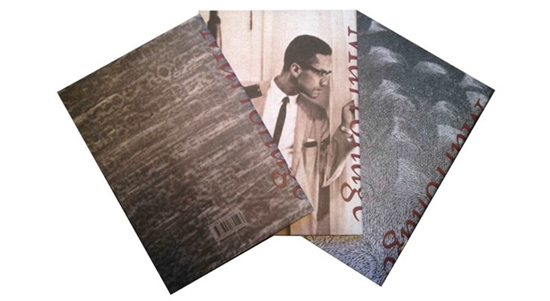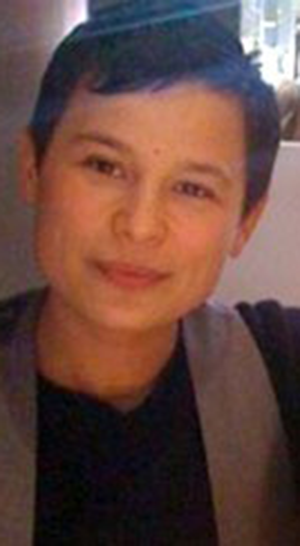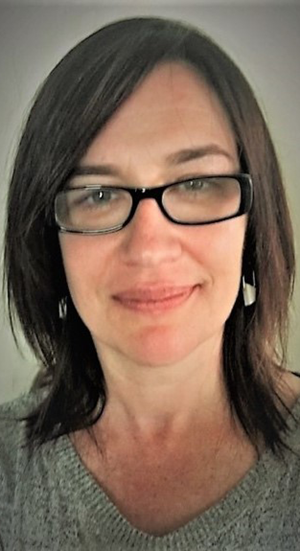Affects. Borders. Biopolitics - LOVA-konference
August 21-23 2019
This conference invites researchers from a wide range of disciplines to investigate how and to what effects areas such as nation, migration, borders, belonging, kinship, communities, and diaspora are conceptually and politically governed through affect at a time in which racist and anti-immigration politics are on the rise in many parts of the world.
The Affects. Borders. Biopolitics. conference is a collaboration between Center for Gender Studies at University of Copenhagen, Denmark, and Network for Gender Studies at University of Stavanger, Norway, and it is part of the research project Loving Attachment: Regulating Danish Love Migration (LOVA), funded by the Independent Research Fund Denmark, 2017-2021.
Keynotes
Against the Politics of Killing Slowly: Addressing the necropolitics of the European deportation regime
Freedom of Movements Research Collective & Marronage

Photo: Amin Zeneyedpoor

With this talk, we invite to a discussion on the current politics of mass deportation that has become one of European governments' primary ways of govern unwanted migration.
Drawing on the struggles of deportable communities in response to harmful state policies, we suggest to approach deportation as a form of necropolitics (Mbembe 2003) that through direct coercion and formal abandonment causes injury to racialised groups of noncitizens.
Professional bios
The Freedom of Movements Research Collective formed in 2017 with the aim of documenting the harmful effects European border, asylum and deportation policies and the ways in which they have been contested by the people affected. Inspired by – and in support of – the self-organised struggles of people who, after their asylum application was rejected in Denmark, were subjected to the Danish government's 'intolerability regime' (Suárez-Krabbe and Lindberg 2019) the collective published the report Stop Killing us Slowly: A research report on the Motivation Enhancement Measures and the Criminalisation of Rejected Asylum seekers in Denmark (2018). Working in the traditions of de-colonial and socio-legal scholarship and migration research respectively, the collective cooperates with people involved in struggles against institutional racism and systemic violence of the European border and deportation policies. Its members are:
- Research coordinator: Julia Suárez-Krabbe, Associate Professor, Cultural Encounters, Department of Communication and Arts, Roskilde University
- Research participants: Annika Lindberg, PhD Candidate, Institute of Sociology, University of Bern; José Arce-Bayona, MA student, Global Refugee Studies, Aalborg University.
Freedom of Movements Research Collective. 2018. Stop Killing Us Slowly: A Research Report on the Criminalization of Rejected Asylum Seekers in Denmark. Roskilde: Roskilde University.
Mbembe, Achille. 2003. “Necropolitics.” Public Culture 15 (1): 11–40.
Suárez-Krabbe, Julia and Annika Lindberg. 2019. "Enforcing Apartheid? The Politics of Intolerability in the Danish Migration and Integration Regimes". Migration and Society, 2: 90-97.
Marronage is a decolonial feminist collective, that emerged in 2016 to politicise the centennial of the sale of the former Danish West Indies to the United States. Together with other likeminded collectives and comrades, we organise discursive events, workshops, demonstrations, actions, interventions, texts, video, audio, imagery, financial support with the aim of working towards the abolition of a still colonizing world.
More than a Feeling: Reflections on Love, Corporeality, and Security Apparatuses in Migration Management Processes
Anne-Marie D’Aoust, Professor, Department of Political Science, Université du Québec à Montréal
 Love moves people. This encompasses the different ways in which we do or are pushed to do things – and go places – we perhaps would not have expected to otherwise. But love itself is also a movement towards specific people, objects, and sites that are deemed worthy of our affection. This movement is an embodied experience, one that builds on experiences of acknowledgment and vulnerability. Mobilizing the concept of “technologies of love” in relation to migration, notably family reunification processes, acknowledges the movement toward community implied by love, with its direction and diversions, while also taking into account how this movement is interwoven in other flows and assemblages, those of law and sovereignty, especially. The latter’s material and spatial features are indistinguishable from relations of power, and the the role bodies play in their unfolding; the ways bodies relate to each other, touch and cannot touch, and how corporeal relations get to governed, sanctioned, prohibited, and allowed. Using these insight as a starting point, and building on queer and feminist love studies, this presentation examines the theoretical underpinnings and challenges of thinking about love in relation to movement(s), and how technologies of love might help us understand the relationalities of bodies, affect and biopower in securitization processes deployed toward specific forms of migration. How do we think politically about love, its movements and displays, and security apparatuses? What does it imply to say that love is a technology, and what does it do, as a technology, to ourselves, and to the way we relate to the world?
Love moves people. This encompasses the different ways in which we do or are pushed to do things – and go places – we perhaps would not have expected to otherwise. But love itself is also a movement towards specific people, objects, and sites that are deemed worthy of our affection. This movement is an embodied experience, one that builds on experiences of acknowledgment and vulnerability. Mobilizing the concept of “technologies of love” in relation to migration, notably family reunification processes, acknowledges the movement toward community implied by love, with its direction and diversions, while also taking into account how this movement is interwoven in other flows and assemblages, those of law and sovereignty, especially. The latter’s material and spatial features are indistinguishable from relations of power, and the the role bodies play in their unfolding; the ways bodies relate to each other, touch and cannot touch, and how corporeal relations get to governed, sanctioned, prohibited, and allowed. Using these insight as a starting point, and building on queer and feminist love studies, this presentation examines the theoretical underpinnings and challenges of thinking about love in relation to movement(s), and how technologies of love might help us understand the relationalities of bodies, affect and biopower in securitization processes deployed toward specific forms of migration. How do we think politically about love, its movements and displays, and security apparatuses? What does it imply to say that love is a technology, and what does it do, as a technology, to ourselves, and to the way we relate to the world?
Professional bio
Anne-Marie D’Aoust is an Associate Professor in the Department of Political Science at the Université du Québec à Montréal (UQAM). She is also co-director of UQAM’s Centre de recherche en immigration, ethnicité et citoyenneté [Research Center on immigration, ethnicity and citizenship]. Her publications include the edited volume Affective Economies, Neoliberalism, and Governmentality (Routledge, 2015), and her work has been featured in journals such as Champ pénal/Penal Field, Society and Space, and International Political Sociology.
Situated at the crossroad of critical security studies, international political sociology, and feminist and gender studies, her main research project centers on the connections between love, governmentality, and security when it comes to marriage and partner migration management practices. Empirically, her current work focuses on lawyers, and their role inside the moral economy of trust and suspicion governing marriage and partner migration management. Theoretically, she aims to explore how love functions as a technology of government, and what it means for subject-making and political processes to say that love is a “technology” rather than a simple emotion. Her upcoming publications include an edited volume entitled Transnational Marriage and Partner Migration: Constellations of Security, Citizenship and Rights, forthcoming at Rutgers University Press.
Desiring urban justice: Queer of colour counter-archives of the city
Jin Haritaworn, Associate Professor, Faculty of Environmental Studies, York University
 This talk revisits, in the light of the latest round of intensified racism, the figure of the queer lover who finds protection in the queer neighbourhoods of the global north, as a transitional object that manufactures consent for securitized borders, gentrified inner cities and the control and abandonment of surplus populations (Haritaworn 2015, see also Haritaworn, Kuntsman and Posocco 2012 and Haritaworn, Moussa and Ware 2018a, b). Over the last decade or two, the necropolitical casting of Muslim, Black and other racialized youth through psy and carceral techniques has been rewritten in the affective languages of love and care for minorities. Increasingly, however, we are witnessing, across the political spectrum, the return of an unabashed racism that relies less on welfare or even neoliberal languages of diversity. This talk throws the spotlight on queer of colour counter-archives which perform a broad spectrum of feelings that exceed the plastic affects of neoliberalism and finance capitalism. In these unruly desires, for marvellous grounds and times, worlds appear beyond the spatial and biopolitical moulds of racial capitalism.
This talk revisits, in the light of the latest round of intensified racism, the figure of the queer lover who finds protection in the queer neighbourhoods of the global north, as a transitional object that manufactures consent for securitized borders, gentrified inner cities and the control and abandonment of surplus populations (Haritaworn 2015, see also Haritaworn, Kuntsman and Posocco 2012 and Haritaworn, Moussa and Ware 2018a, b). Over the last decade or two, the necropolitical casting of Muslim, Black and other racialized youth through psy and carceral techniques has been rewritten in the affective languages of love and care for minorities. Increasingly, however, we are witnessing, across the political spectrum, the return of an unabashed racism that relies less on welfare or even neoliberal languages of diversity. This talk throws the spotlight on queer of colour counter-archives which perform a broad spectrum of feelings that exceed the plastic affects of neoliberalism and finance capitalism. In these unruly desires, for marvellous grounds and times, worlds appear beyond the spatial and biopolitical moulds of racial capitalism.
Haritaworn, Jin (2015), Queer Lovers and Hateful Others: Regenerating Violent Times and Places, London: Pluto.
Haritaworn, Jin, Kuntsman, Adi and Posocco, Silvia (2012),Queer Necropolitics, London: Routledge.
Haritaworn, Jin, Moussa, Ghaida and Ware, Syrus Marcus (2018a), Queering Urban Justice: Queer of Colour Formations in Toronto, Toronto: University of Toronto Press.
Haritaworn, Jin, Moussa, Ghaida and Ware, Syrus Marcus (2018b), Marvellous Grounds: Queer of Colour Histories in Toronto, Toronto: University of Toronto Press.
Professional bio
Jin Haritaworn is Associate Professor of Gender, Race and Environment at York University. Their publications include two books, numerous articles (in journals such as GLQ and Society&Space), and several co/edited collections (including Queer Necropolitics and Queering Urban Justice). Their book, Queer Lovers and Hateful Others: Regenerating Violent Times and Places (Pluto 2015), on queer Berlin, addresses both academic and non-academic readerships interested in queer of colour spaces and communities. Jin has made foundational contributions to several fields on both sides of the Atlantic, including gender, sexuality and transgender studies, critical race and ethnic studies, and urban studies, and has left their imprint on various concepts and debates, including gay imperialism, homonationalism, gentrification and criminalization, trans and queer of colour archives and politics, and queer space.
Children and Young People as Emotional Suspects: Theorizing Pediatric Pathologies as Part of Migration Politics
Rachael Stryker, Associate Professor, Department of Human Development and Women’s Studies, California State University, East Bay
 In this presentation, I will explore the construction of migrating/circulating children and young people (CYP) as emotional suspects via pediatric pathologies in three cases around the world: 1) settler colonialism of indigenous youth populations in Canada; 2) Russian child adoption to the United States; and 3) the displacement diaspora of CYP within the West Bank and Gaza, Palestine and Israel. Each case highlights an important way that States emotionally mobilize (and immobilize) migrating children and youth for the purposes of the nation’s own growth and/or permanence. Almost always in relation to western models of trauma and resilience, mental health professionals negotiate a politics of representation to both reproduce and rethink or challenge the typing of migrant youth as emotionally deviant in diverse ways. By highlighting some of these strategies, I trace some of the local and global biopolitics in which migrating and circulating youth – either via their grief, anger, or even joy -- first become “hailed” (see Butler 1990, 1997) as emotionally “other” in familial, activist, institutional, and public and private spaces. I then document some ways in which pediatric healthcare workers and other migration workers engage and/or work with migrating or circulating CYP to reframe youth behaviors, responses, and aspirations along such axes of possibility and impossibility of life course events; mobility and immobility; and intra-statist and neoliberal economies. The data and examples reveal, among other things, the necessarily paradoxical use of western models of trauma and resilience for diagnosing, treating, and reifying circulating youth as emotionally deviant in response to both the local and global cultures and systems of which they are a part. I conclude with some examples of ways that making pediatric pathologies in migration processes more visible in our work as scholars can lead to more successful social justice work with migrating and circulated children and young people.
In this presentation, I will explore the construction of migrating/circulating children and young people (CYP) as emotional suspects via pediatric pathologies in three cases around the world: 1) settler colonialism of indigenous youth populations in Canada; 2) Russian child adoption to the United States; and 3) the displacement diaspora of CYP within the West Bank and Gaza, Palestine and Israel. Each case highlights an important way that States emotionally mobilize (and immobilize) migrating children and youth for the purposes of the nation’s own growth and/or permanence. Almost always in relation to western models of trauma and resilience, mental health professionals negotiate a politics of representation to both reproduce and rethink or challenge the typing of migrant youth as emotionally deviant in diverse ways. By highlighting some of these strategies, I trace some of the local and global biopolitics in which migrating and circulating youth – either via their grief, anger, or even joy -- first become “hailed” (see Butler 1990, 1997) as emotionally “other” in familial, activist, institutional, and public and private spaces. I then document some ways in which pediatric healthcare workers and other migration workers engage and/or work with migrating or circulating CYP to reframe youth behaviors, responses, and aspirations along such axes of possibility and impossibility of life course events; mobility and immobility; and intra-statist and neoliberal economies. The data and examples reveal, among other things, the necessarily paradoxical use of western models of trauma and resilience for diagnosing, treating, and reifying circulating youth as emotionally deviant in response to both the local and global cultures and systems of which they are a part. I conclude with some examples of ways that making pediatric pathologies in migration processes more visible in our work as scholars can lead to more successful social justice work with migrating and circulated children and young people.
Professional bio
Dr. Rachael Stryker received her Ph.D. in Cultural Anthropology from the University of California, Berkeley in 2004, and has explored and written on the comparative study of emotion socialization in children and youth around the world, with a focus on attachment formation and representation, for over twenty years. She is the author of the book, The Road to Evergreen: Adoption, Attachment Therapy, and the Promise of Family (Cornell, 2010), which examines the cultural construction of Reactive Attachment Disorder (RAD) diagnosis and treatment in the United States in light of emerging international and domestic child adoption systems, and has authored several articles on the topic for such journals as International Migration, Global Studies of Childhood, Childhood, Children and Youth Services Review, and Research in Human Development. Dr. Stryker is also a leader in using public interest ethnography for promoting activist-scholarship and social reform, especially for children, youth, and families. She is co-editor (with Roberto González) of Up, Down, and Sideways: Anthropologists Trace the Pathways of Power (Berghahn Books, 2014), and her collaborative research with undergraduates on healthcare in California women’s prisons appears in the popular textbook, Conformity and Conflict: Readings in Cultural Anthropology. Her most recent ethnographic research explores the ways in which CYP emotions are mobilized to produce pediatric psychologies in Palestine under occupation.
